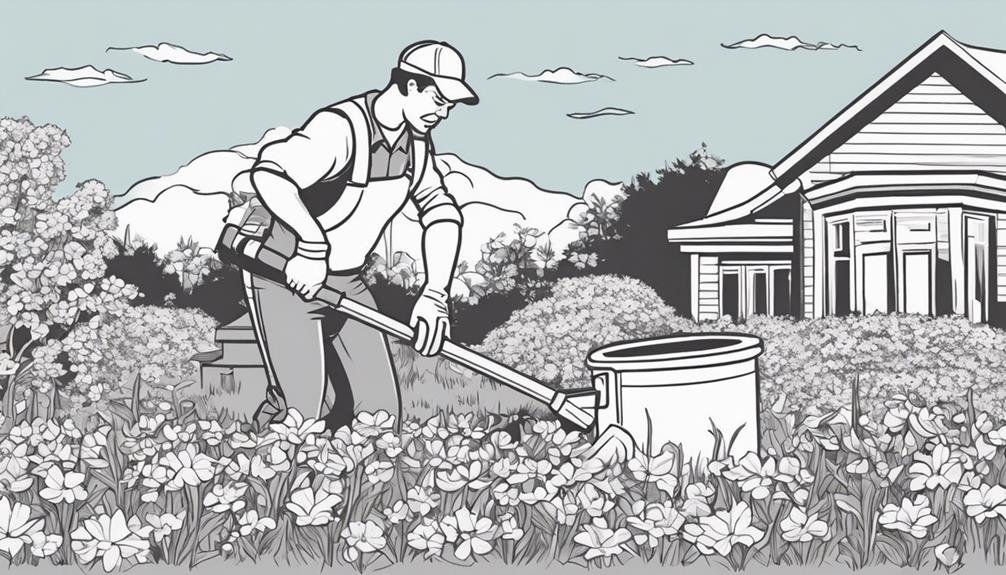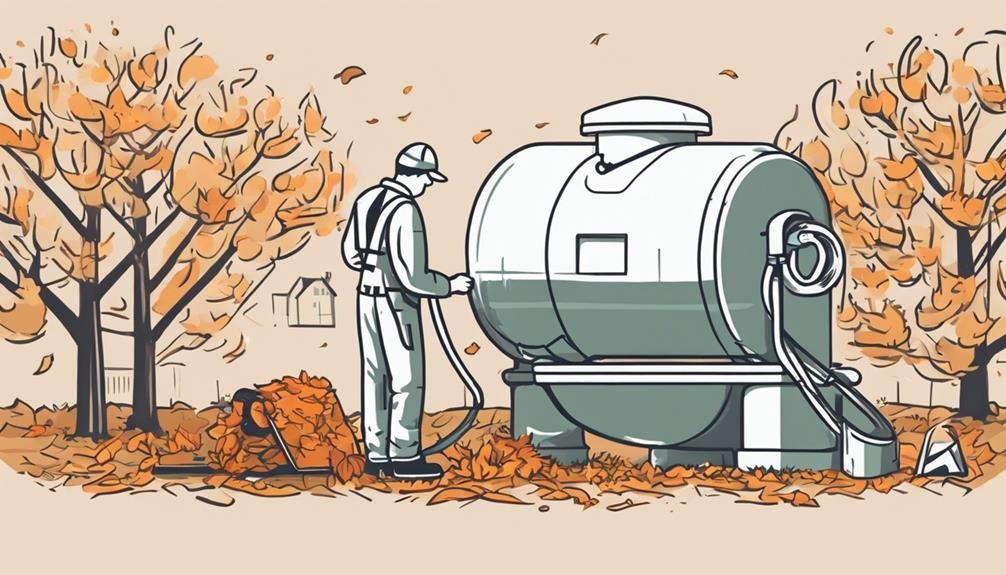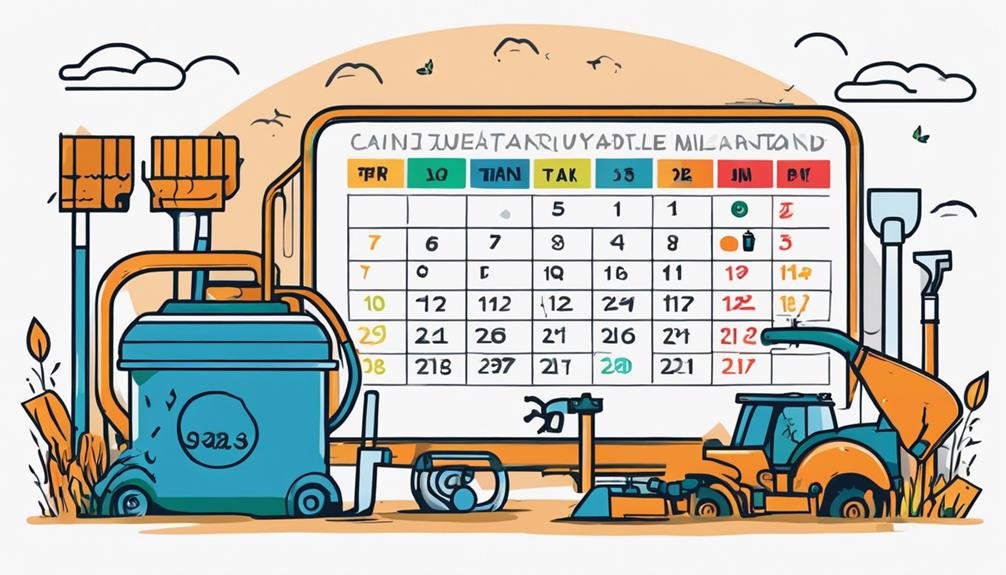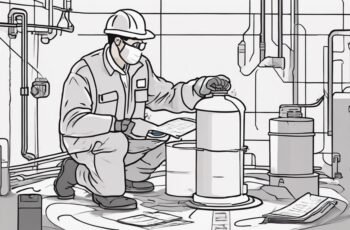In the intricate underground world of your septic tank, seasonal changes can stir up a storm. But fear not! By taking proactive measures, you can ensure your system weathers every season smoothly.
From spring's awakening to winter's icy grip, each time of year demands specific care to keep your septic tank in top-notch condition.
So, how can you safeguard your septic system through the whims of nature and maintain its efficiency? Let's explore the essential strategies to keep your septic tank running smoothly in every season.
Key Takeaways
- Regularly inspect and maintain the septic tank and drainage systems.
- Implement seasonal strategies for optimal septic system performance.
- Prevent damage by managing water flow and soil conditions year-round.
- Use septic-safe practices and products to preserve system functionality.
Spring Maintenance Tips

When preparing your septic tank for the spring season, prioritize inspecting and cleaning the system to ensure optimal functionality. Start by checking the soil health around your septic tank. Soil health plays a critical role in the proper functioning of your system. Compacted soil can lead to poor drainage and potential backups. Make sure the area is free from any debris or heavy objects that could compress the soil above your tank or drain field.
Next, focus on inspecting the drainage systems connected to your septic tank. Check for any signs of blockages or leaks. Ensure that the pipes are clear of roots, debris, or any other obstructions that could impede the flow of wastewater. Proper drainage is essential for the efficient operation of your septic system. Addressing any issues promptly can prevent costly repairs down the line.
Summer Septic Tank Care
Maintaining your septic tank during the summer months is crucial for ensuring its continued efficiency and longevity. To keep your system running smoothly, consider implementing drainage solutions and odor control measures. Summer can bring heavy rainfall, leading to potential oversaturation of your drain field. To prevent this, ensure that surface water is directed away from the septic system. Proper grading, installing gutter downspout extensions, and using French drains can help manage excess water and prevent flooding around the tank and drain field.
Additionally, hot weather can exacerbate septic tank odors. To address this issue, make sure that all plumbing fixtures are used regularly to maintain a consistent flow of water through the system. You can also introduce septic-safe additives to help break down waste and control odors. Avoid flushing harmful chemicals or large amounts of cleaners down the drains, as these can disrupt the balance of beneficial bacteria in the tank.
Fall Maintenance Strategies

Implementing seasonal maintenance strategies for your septic tank in the fall is essential to ensure its optimal performance and longevity. As the leaves start to fall, it's crucial to keep them away from your septic system. Make sure to regularly remove any leaves or debris that may accumulate on or around the tank and drain field. This simple task can prevent clogs and potential damage to your system.
Additionally, fall is an ideal time to inspect the soil around your septic system. Check for any signs of erosion, compaction, or pooling water. Proper soil conditions are vital for the absorption of effluent from your tank. If you notice any issues, consider aerating the soil or planting grass over the drain field to enhance absorption.
Winter DIY Maintenance Guide
Now that fall maintenance tasks are complete, focus on preparing your septic system for the winter months with our Winter DIY Maintenance Guide.
Proper insulation techniques are crucial during winter to prevent your septic system from freezing. Start by insulating exposed pipes and the septic tank itself with foam insulation sleeves or heat tape. Make sure to seal any gaps or cracks that could let cold air in. Additionally, consider using straw or mulch as natural insulation around the tank and pipes.
Snow removal is another essential aspect of winter septic system care. Keep heavy snow off the septic system components to prevent damage. Shovel snow away from the tank and drain field area to avoid excessive weight on the system. Be cautious not to pile snow on top of these areas as it can insulate the ground and prevent proper drainage.
Year-Round Septic Tank Care

To ensure optimal functioning of your septic tank year-round, regular inspection and maintenance are essential. Routine inspections play a crucial role in identifying any potential issues before they escalate into costly problems. It's recommended to schedule professional inspections at least once a year to assess the system's condition and performance. Additionally, conducting your visual inspections periodically can help you catch any early warning signs, such as pooling water or unusual odors, that indicate a problem.
Incorporating preventative measures into your septic tank care routine can significantly extend the system's lifespan. Avoid flushing non-biodegradable items, grease, or chemicals down the drains to prevent clogs and damage to the tank. Implement water conservation practices, such as fixing leaks and spreading out laundry loads, to reduce the strain on your septic system. Furthermore, be mindful of what goes into your tank and consider using septic-safe products to maintain a healthy balance of bacteria.
Frequently Asked Questions
How Often Should Septic Tank Pumping Be Done Throughout the Year?
You should consider septic tank pumping frequency based on seasonal factors. It's recommended to pump every 3-5 years. DIY maintenance, like watching water usage and avoiding harsh chemicals, can help extend time between pumpings and keep your system healthy.
Are There Any Specific Products or Additives That Should Be Avoided When Maintaining a Septic Tank?
When maintaining your septic tank, avoid harmful additives like bleach, antibacterial soaps, and strong chemicals. Instead, opt for septic-safe products or natural alternatives to prevent damage. Following proper maintenance practices is crucial for a healthy system.
What Are Some Signs That Indicate a Septic Tank May Need Professional Maintenance or Repairs?
If you notice foul odors, slow drains, or pooling water near the septic tank, those are warning signs that it may need professional maintenance. These indicators suggest potential issues that require repairs by a specialist.
Can Landscaping or Gardening Near a Septic Tank Impact Its Performance?
Planting trees or shrubs near your septic tank can impact its performance. Roots may infiltrate and damage the system. Take maintenance precautions like planting at a safe distance. Consider gardening away from the tank to avoid potential issues.
Are There Any Specific Water Conservation Tips That Can Help Prolong the Life of a Septic Tank System?
To maintain septic health and extend its longevity, implement water-saving strategies. Fix leaks promptly, install low-flow fixtures, and spread out laundry loads. These preventive maintenance steps can reduce water usage, easing the strain on your septic system.
Conclusion
Take care of your septic tank year-round to avoid costly repairs and keep your system running smoothly. Remember to regularly schedule maintenance checks, pump your tank every few years, and be mindful of what goes down your drains.
By following these proactive care tips for every season, you can ensure your septic tank stays in optimal condition and avoid any unpleasant surprises.
Keep your septic system healthy and your home happy!

